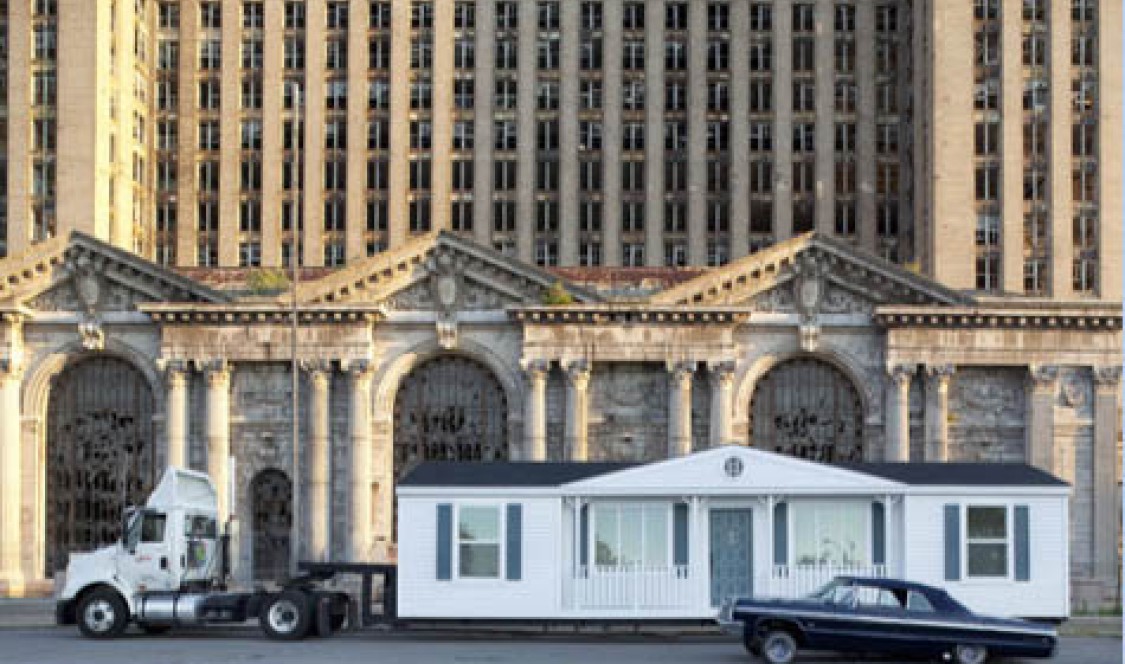On Sunday, May 4 in the Mary Pickford Auditorium, the Gould Center will present three parts of a film documentary produced by Mike Kelley: Mobile Homestead Christening Ceremony and Launch, September 25, 2010; Going West on Michigan Avenue from Downtown Detroit to Westland; and Going East on Michigan Avenue from Westland to Downtown Detroit. Between the second and third parts there will be a panel discussion with cinematographer Oren Goldenberg, producer Scott Benzel, editor Molly Fitzjarrald, Mary Clare Stevens (director, Mike Kelley Foundation for the Arts), Alex Juhasz (Pitzer College), Michelle Puetz (Museum of Contemporary Art Chicago), and leading experts on Kelley’s work. These films focus on the people and communities who live and work along Michigan Avenue, one of Detroit's main arteries and passageway to the western suburbs, as part of Kelley’s Mobile Homestead project.
"This is a great documentary about Detroit in economic crisis; about America in transition,” said Gould Center director Robert Faggen, the Barton Evans and H. Andrea Neves Professor of Literature.
Mobile Homestead began in 2005 when Mike Kelley was approached by the UK-based Artangel organization, which commissions and produces site-specific artwork, to propose what would be their first commission in the United States. The late artist describes Mobile Homestead as “a full-scale replica of the house in which I was raised (a single-story ranch-style house), which still exists in the Detroit suburb of Westland, a working-class residential neighborhood.
The replica will exist permanently on a grassy lot adjacent to Museum of Contemporary Art Detroit (MOCAD), where it will function as a community gallery— in concert with various local community groups. The facade of the structure is designed to be removable and is mounted on a chassis; it is ‘street legal’ and close in size to a traditional mobile home so that it may be driven around the Detroit area to provide various sorts of public services. It is my wish that the community gallery will not simply be an outpost of MOCAD, but that it represent the cultural interests of the community that exists in proximity to it.”
On Saturday, September 25, 2010, the trailer portion made its maiden voyage from its new home in Midtown Detroit to return to the original Kelley home in the suburbs. In a largely disinvested city with many abandoned houses and dilapidated buildings, the route enacts a reversal of the 'white flight' that took place in Detroit following the inner city uprisings of the 1960s. Going West on Michigan Avenue from Downtown Detroit to Westland; and Going East on Michigan Avenue from Westland to Downtown Detroit trace a remarkable variety of both urban and outlying areas, making apparent the socio-economic disparities among the communities through which Mobile Homestead passed.
Along the way, interviews were conducted with shop owners and residents, including a motorcycle gang, strip-club dancers, church officials, the staff of social service organizations, and representatives of the Ford Motor Company. The third video documents the 2010 launch event of the mobile section of the project that occurred on the site at MOCAD where the completed permanent site now stands. Taken together, these videos convey Kelley’s critical eye on this American city that he knew so well.
Mike Kelley (1954-2012) was born in Detroit, Michigan. He received a BFA from the University of Michigan, and an MFA from the California Institute of the Arts. Kelley’s work ranges from highly symbolic and ritualistic performance pieces to arrangements of stuffed-animal sculptures, to wall-size drawings, to multi-room installations that restage institutional environments (schools, offices, zoos), to extended collaborations with artists such as Paul McCarthy, Tony Oursler, and the band Sonic Youth. His work questions the legitimacy of “normative” values and systems of authority, and attacks the sanctity of cultural attitudes toward family, religion, sexuality, art history, and education.
“The Mobile Homestead project,” he explains, “is my first sustained attempt to delve into the world of public art—something I have always shied away from in the past. I have a deep distrust of art that is foisted upon the public; I prefer that people go and see art if they choose to do so. (Of course, this stance does not apply to guerilla art—such as political protests or graffiti art, etc.—which is specifically intended to be transgressive. I mean, in this case, public art that is sanctioned by tax-payer dollars or public institutions.)” (Read Kelley's full essay about the project, written in 2011, here.)
Mike Kelley received the Skowhegan Medal in Mixed Media, and two grants from the National Endowment for the Arts. Major solo exhibitions include Whitney Museum of American Art, New York; Los Angeles County Museum of Art; Hirshhorn Museum and Sculpture Garden, Washington, DC; Tate Liverpool; Centre Georges Pompidou, Paris; and Kunsthalle, Basel; among others.

